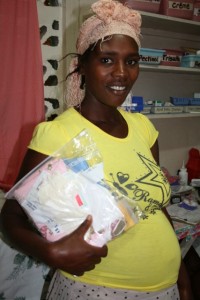It is always an encouragement to us here at RHFH when we realize that so many people share our heart for the precious folks in the Cazale area. We’d like to share an example of a fun, simple way that some of our friends have helped out.
Some of our supporters have assembled birthing kits for RHFH to distribute to expectant mothers that come in to the clinic for maternity care. Childbirth in Haiti is far different for most mothers compared to what mothers experience in the United States and other developed countries. According to the World Health Organization, only 26% of births in Haiti are attended by skilled health personnel. The number is even lower for women in rural areas, which is what Cazale and the surrounding area would be considered. Only 15% of births in a rural setting are attended by skilled health personnel. Keep in mind that a delivery “attended by skilled health personnel” does not necessarily mean a delivery at a hospital, but can include delivery in the home with the assistance of a trained midwife.
Let those numbers sink in. On average, four out of five women in the villages and mountains surrounding RHFH deliver their babies without the benefit of being in a hospital or even having a doctor, nurse, or midwife present.
So what do these women need in order to have safer, more successful deliveries? A simple birthing kit is a step in the right direction.
A birthing kit includes a pair of latex gloves, alcohol swabs, gauze, a small blanket for the baby to be wrapped and cleaned with, and most importantly, a sterile razor blade along with two strings to properly tie off the umbilical cord. When cutting the umbilical cord, if unclean tools are used, such as a non-sterile knife or scissors, the infant can become sick with tetanus or other infections, which can be fatal. By simply having the inexpensive, necessary tools needed, lives can be saved. It’s just that basic.
Tammy in Minnesota had a fantastic idea that we want to share. She hosted an event, in celebration of Mother’s Day, to support our efforts of loving on our expectant Haitian mothers. Tammy shared information about Haiti and RHFH with the group. They then took the items they had brought with them to donate and formed an assembly line. They put together 100 birthing kits! Those kits will be shipped to us at RHFH this fall on our shipping container, and then be put directly into the hands of thankful mothers at our clinic.
We already have several birthing kits that were donated to us by other RHFH supporters from all across the map. They arrived here on our spring shipping container. It’s a wonderful thing to know that this need is being met by caring, creative friends. Since we will hand out approximately 50 kits per month, we know that by the time our current supply runs out, a new shipment will be arriving. God is so good!










Comments(3)
kathy says
July 13, 2012 at 11:07 amWe take so much for granted.
Beth says
July 14, 2012 at 9:00 pmCould you give a little more information on the birthing kits, for those of us non-medical people? Like what type of gauze and how much? What kind of string? Is it OK if the receiving blanket is gently used? Thank you so much!
Debbie Woodward says
July 16, 2012 at 9:38 amSupplies Needed
• Gallon Size Zip Lock Bag
• Quality Single-Edge Razor Blade (wrapped)
• Receiving Blanket (can use one yard cuts of baby flannel or GENTLY USED w/no stains)
• 2 pieces – 10”- 12” Umbilical Tape (order online in 100 yard roll for a group project.)
• 1-Pair medium size exam gloves
• 1 Bar of Soap (hotel size is okay)
• 8 – Alcohol Prep Pads
• 6 – 2” x 2” gauze squares
• 1 – Piece of cloth 18”-22” long and 3”-4” wide. (used as a binder to hold the gauze in place). They cut up sheets.
• 1 – Plastic back sheeting like a medical drape
Feel free to e-mail me if you have any questions. Debra_Woodward@msn.com